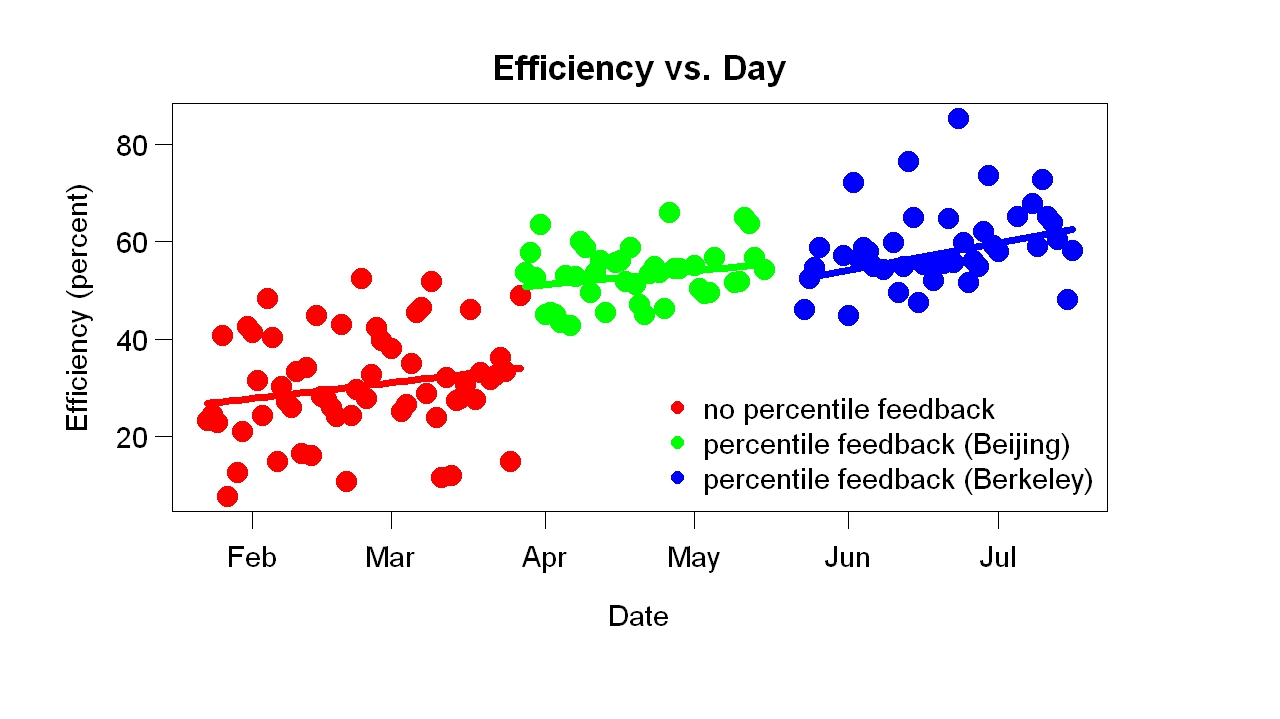In March I discovered that looking at a graph of my productivity (for the current day, with a percentile attached) was a big help. My “efficiency” — the time spent working that day divided by the time available to work — jumped as soon as the new feedback started (as this graph shows). The percentile score, which I can get at any moment during the day, indicates how my current efficiency score ranks according to scores from previous days within one hour of the same time. For example, a score of 50 at 1 p.m. means that half of the previous days’ scores from noon to 2 p.m. were better, half worse. The time available to work starts when I get up. For example, if I got up at 4 a.m., at 6 a.m. there were 2 hours available to work. The measurement period usually stops at dinner time or in the early evening.
This graph shows the results so far. It shows efficiency scores at the end of each day. (Now and then I take a day off.) One interesting fact is I’ve kept doing it. The data collection isn’t automated; I shift to R to collect it, typing “work.start” or “work.stop” or “work.switch” when I start, stop, or switch tasks. This is the third or fourth time I’ve tried some sort of work tracking system and the first time I have persisted this long. Another interesting fact is the slow improvement, shown by the positive slopes of the fitted lines. Apparently I am slowly developing better work habits.
The behavioral engineering is more complicated than you might think. My daily activities naturally divide into three categories: 1. things I want to do but have to push myself to do. This helps with that, obviously. 2. things I don’t want to do a lot of but have to push myself away from (e.g., web surfing). 3. things I want to do and have no trouble doing. But the recording system is binary. What do I do with activities in the third category? Eventually I decided to put the short-duration examples (e.g., standing on one foot, lasts 10 minutes) in the first category (counts as work), keeping the long-duration examples (e.g., walking, might last one hour) in the second category (doesn’t count as work).
Before I started this I thought of a dozen reasons why it wouldn’t work, but it has. In line with my belief that it is better to do than to think.

Hi, Seth. I have enjoyed your blog for a while but am a first-time commenter. Many thanks for all your insights. (I have especially enjoyed and benefited by your articles on fermented foods.)
Your tracking system seems helpful. When doing work that requires creativity or deep insight, however (as I’m sure much of your work does), I would be reluctant to use this sort of tracking system for fear of over-emphasizing quantity of work at the expense of quality. I tend to prefer productivity systems that focus attention on outputs rather than inputs, thereby rewarding efficiency and creativity.
Have you found your tracking system to have any adverse effects on the quality of your work or your morale? Have you tried tracking other variables that measure your outputs rather than your inputs?
I would think that “productivity systems that focus attention on outputs” reward quantity at the expense of quality. For example, how many words you have written at the expense of the quality of those words. They reward efficiency, yes, but I don’t see how they reward creativity.
One reason I measure time spent (an input) rather than other things (such as outputs) is exactly this issue: to encourage quality over quantity. Maybe I can’t produce much output (= words) but at least I get credit for trying. To answer your question about adverse effects, I haven’t noticed any change in quality. The system has improved my morale since I am more aware of making progress every day and believe I am using my time more productively (in terms of time spent working).
Thanks for your thoughtful reply, Seth.
I agree that a crude measure of output such as # of words written would tend to lower quality, and I was not recommending such a measure. Since you are monitoring yourself, you are free to try more nuanced and more subjective measures of output than raw word counts (as, for example, when you measure the quality of your sleep). I don’t know whether you would find such measures as useful as your current measure of efficiency, but they may merit some experiments.
Seth, a little off topic here, but I’d be curious to know what you think of “brain training” like Lumosity. I would really like to think I could improve my overall mental performance by playing these games every day, and the software (on-line) offers tracking functions to show if improvement is being made.
carl, I believe you will improve only on tasks similar to the task you practice on.
seth, thanks for the reply. that’s a good thought. i agree it’s probably not a a good idea to put too much stock into it. still, i’m going to continue to play them, mostly because I enjoy them and it seems to help refresh the mind on occasion.